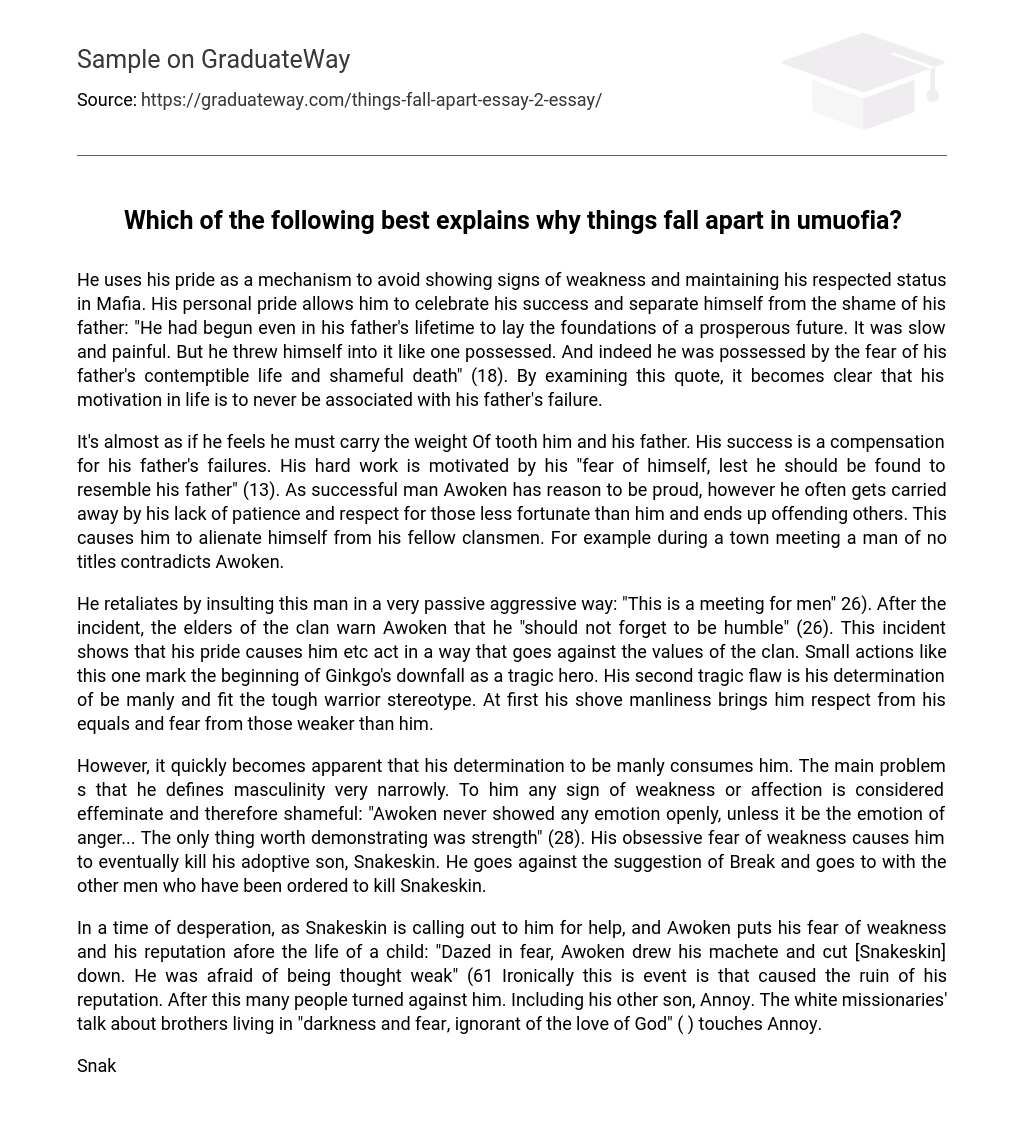He uses his pride as a mechanism to avoid showing signs of weakness and maintaining his respected status in Mafia. His personal pride allows him to celebrate his success and separate himself from the shame of his father: “He had begun even in his father’s lifetime to lay the foundations of a prosperous future. It was slow and painful. But he threw himself into it like one possessed. And indeed he was possessed by the fear of his father’s contemptible life and shameful death” (18). By examining this quote, it becomes clear that his motivation in life is to never be associated with his father’s failure.
It’s almost as if he feels he must carry the weight Of tooth him and his father. His success is a compensation for his father’s failures. His hard work is motivated by his “fear of himself, lest he should be found to resemble his father” (13). As successful man Awoken has reason to be proud, however he often gets carried away by his lack of patience and respect for those less fortunate than him and ends up offending others. This causes him to alienate himself from his fellow clansmen. For example during a town meeting a man of no titles contradicts Awoken.
He retaliates by insulting this man in a very passive aggressive way: “This is a meeting for men” 26). After the incident, the elders of the clan warn Awoken that he “should not forget to be humble” (26). This incident shows that his pride causes him etc act in a way that goes against the values of the clan. Small actions like this one mark the beginning of Ginkgo’s downfall as a tragic hero. His second tragic flaw is his determination of be manly and fit the tough warrior stereotype. At first his shove manliness brings him respect from his equals and fear from those weaker than him.
However, it quickly becomes apparent that his determination to be manly consumes him. The main problem s that he defines masculinity very narrowly. To him any sign of weakness or affection is considered effeminate and therefore shameful: “Awoken never showed any emotion openly, unless it be the emotion of anger… The only thing worth demonstrating was strength” (28). His obsessive fear of weakness causes him to eventually kill his adoptive son, Snakeskin. He goes against the suggestion of Break and goes to with the other men who have been ordered to kill Snakeskin.
In a time of desperation, as Snakeskin is calling out to him for help, and Awoken puts his fear of weakness and his reputation afore the life of a child: “Dazed in fear, Awoken drew his machete and cut [Snakeskin] down. He was afraid of being thought weak” (61 Ironically this is event is that caused the ruin of his reputation. After this many people turned against him. Including his other son, Annoy. The white missionaries’ talk about brothers living in “darkness and fear, ignorant of the love of God” ( ) touches Annoy.
Snakeskin’s killing causes Annoy to question the tribe’s values and his father’s values as well. Ginkgo’s last tragic flaw is his extremely narrow mindset. Having a lazy and irresponsible father, Awoken never learned what a respectable man should e like from his family. His idea of what a good/respectable man looks like is self taught. To him, a respectable man is anything but his father. The one thing that his father was good at, communication and interacting with people, Awoken deems as worthless.
Ginkgo’s “fame rested on solid personal achievements” (1 Additionally, his one-tracked mind solely focused on success, causes him to measure himself by very narrow standards. The qualities he values stem from rotational Bio standards for what a warrior should be like (tough, masculine, fearless, showing no emotion). When the white men arrive these standards slowly become less meaningful. Awoken becomes nostalgic of the days when a warrior like him, with many physical achievements to show for, was respected: “They had listened to him with respect.
It was like the good old days again, when a warrior was a warrior ” (192). He relied on the old ways of the Bio culture because it provided a structure by which he measure the status/respect that he worked so hard to achieve. This declination in his self-worth is what eventually leads him to commit suicide. In the white justice system and the white culture his achievements mean nothing. This is clearly seen when the court messengers mock Awoken and the other leaders of Mafia when they are held in jail: “We see that every pauper wears and anklet of the title in Mafia.
Does it cost as much as ten cowries? ” (195). In Bio culture a success man is treated with respect. When Awoken is disrespected by the white men and later by his own people when they won’t fight with him, he feels he is no longer a respectable man. This leads him to take his life because for Awoken even death is better than failure. Ginkgo’s three tragic flaws: pride, fear of weakness and resistance to hanged eventually lead to his isolation from his own people and his downfall as a tragic hero.





